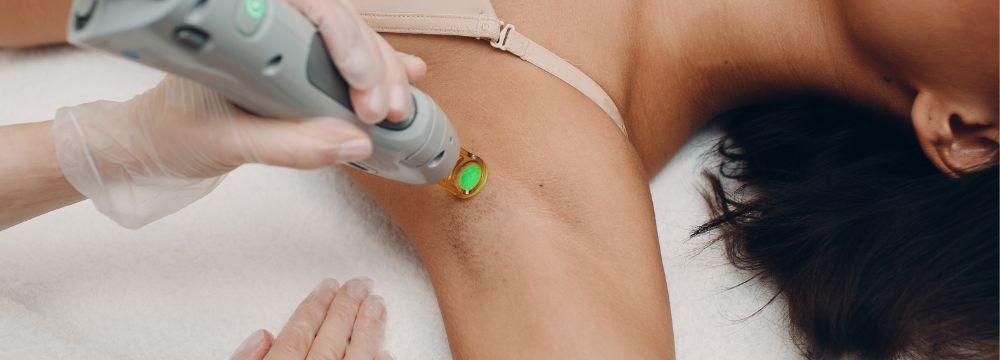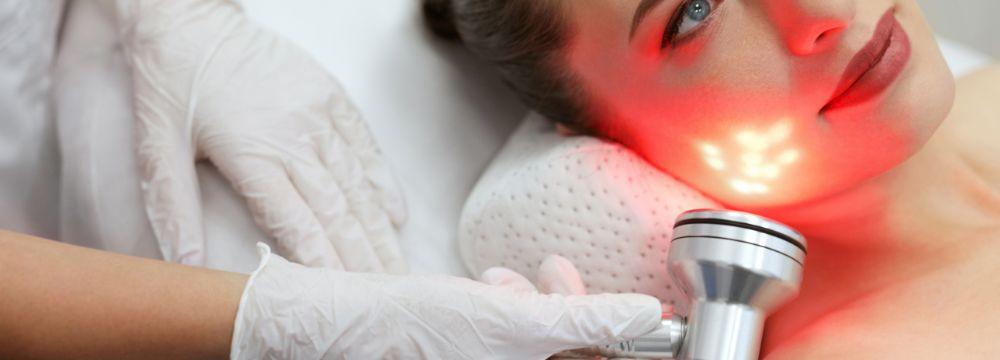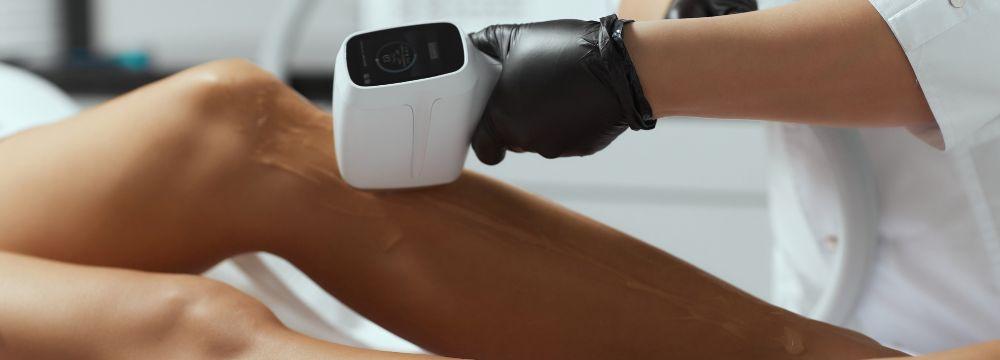How We Minimize Skin Discoloration After Laser Treatments
As laser facial and body treatments grow in popularity and accessibility, your dermatologist will discuss the risk of unwanted side effects following therapy. While some side effects, such as pain, swelling, and redness, are temporary, the discoloration some people experience following laser treatments can be longer-lasting without preventative care or additional treatment. This is why it is critical to minimize the risk of skin discoloration as much as possible.
Let’s discuss what causes the skin to discolor in the first place. After laser treatment, inflammation is our body’s natural mechanism that spearheads healing. The healing following laser treatments is part of why the laser is useful. However, there is a risk of post-inflammatory hyperpigmentation or PIH when inflammation occurs for any reason. PIH can arise from many conditions – like acne, eczema, or injury. And laser treatment is exactly that – a controlled injury to the skin at exact depths and locations.
It seems counter-intuitive that lasers can both treat and be the cause or trigger for hyperpigmentation. However, the lasers used to treat discolorations, including vascular and pigmentary versions, target chromophores (or colors) in the tissue. There are dozens of lasers on the market used to treat various conditions, many of which have indications unrelated to the treatment of pigmentation.
High-Risk Patients
So, who is at risk for these unwanted pigmentary effects? It turns out that everyone is. While the ubiquitous Fitzpatrick scale categorizes lighter skin types (I-II) and darker skin types (III-VI), it doesn’t matter how much pigment your skin has; PIH can occur regardless. That said, darker skin types are at an increased risk for PIH and may have more severe manifestations. This is simply because more pigment or melanin is present, making the discolorations more pronounced. In fact, for this reason, some lasers are not indicated for darker skin types and those that typically use different settings to reduce the risk.
What Can Reduce the Risk of Developing Pih Following Laser Treatments?
As any dermatologist will tell you, the key is sun protection. Sun protection is a good idea even if you haven’t or never plan to have laser since photodamage to the skin causes unwanted pigment to develop – lentigines or brown patches and other unwanted pigmented lesions are highly connected to long-term UV damage. As such, sun protection following laser treatments is the number one way to reduce the risk of post-inflammatory hyperpigmentation.
Other ways to reduce PIH risks are by using dermatologist-approved moisturizers and emollients. By providing the skin with the necessary moisture, the environment is optimized for healing. This is true not only for post-laser care but for any injury to the skin – regardless of the cause. Make sure to use a fragrance-free moisturizer that does not contain irritating ingredients. Just because a product is “natural” does not mean it is safe. Many irritating products contain natural ingredients that people become sensitive to – ingredients like tea tree, or aloe are typical examples.
Sun protection after treatment is primarily achieved with a high-quality daily sunscreen made for sensitive skin – this means it is free from fragrances and additives that could further irritate already inflamed skin. Sunscreens most recommended by dermatologists for post-laser are physical barriers – mineral based – though some chemical formulations are also designed for sensitive skin. The key is to ensure it is applied before any UV exposure and typically re-applied throughout the day since it may only be effective for a few hours, especially if you’re swimming or sweating.
While sunscreen is a great way to reduce the risk of discoloration after laser treatments, another option is sun avoidance. While it’s not always possible or practical, if you can completely stay out of the sun following treatments, you can further reduce the risk of hyperpigmentation.
Sunscreen with a wide-brimmed hat is an excellent option to combine these two strategies. This provides a multi-pronged approach to the reduction of UV exposure that still allows you to enjoy daily life and participate in activities while getting the best possible protection you can while outdoors.
Dispelling Myths
A common myth is that you are safe if you don’t get a sunburn or a tan. This is not true. Even tiny doses of UV to inflamed skin can trigger melanin synthesis. Melanin production happens in our skin’s cells within a minute, depending on the sun’s strength.
Another common myth is that if cloudy outside, you aren’t getting enough UV to cause problems. UV radiation can penetrate the atmosphere and clouds as well. It can also reflect off water and clouds, meaning that even if you are not getting direct sun onto your skin, reflected light can have an effect. No matter the time of day or where you live, sun protection is critical following laser procedures.
Correcting PIH
If you do experience PIH following laser treatments – there are options, albeit limited and with minimal high-quality research to support them. Standard treatment options for PIH are medicated creams that your dermatologist can prescribe, such as tretinoin or retinol, as well as hydroquinone. Azelaic acid is another option, along with chemical peels. Finally – microneedling has shown some benefits for PHI, but more research is needed to determine the best approach.
This is why it’s better to avoid getting PIH to begin with than try and treat it. PIH is notoriously stubborn; for some people, it can be permanent. Whenever possible – prevention of pigmentary issues is the best strategy!
Ensure you receive the very best laser treatment by visiting North Atlanta Dermatology. Our highly skilled dermatologists and PAs will help you with the ideal skincare regimen and address any of your pigmentation concerns.




